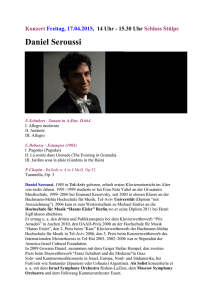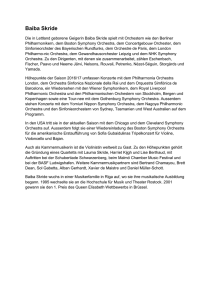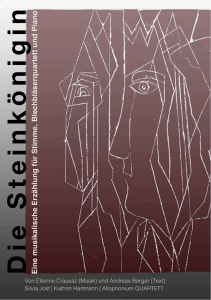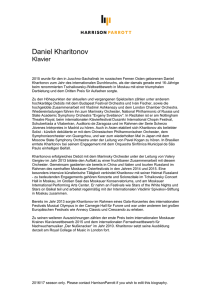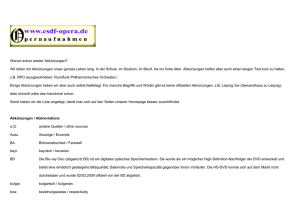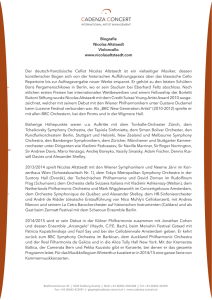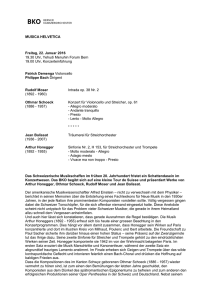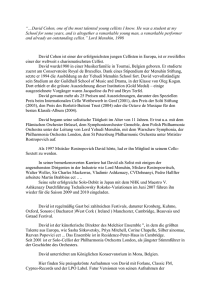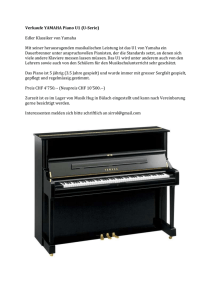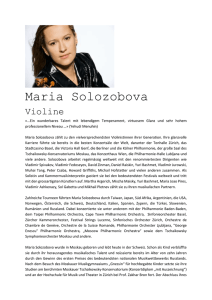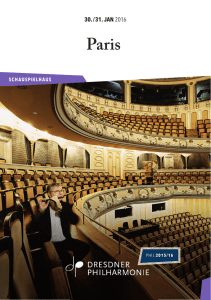piano concertos by serge prokofiev and aram khachaturian
Werbung
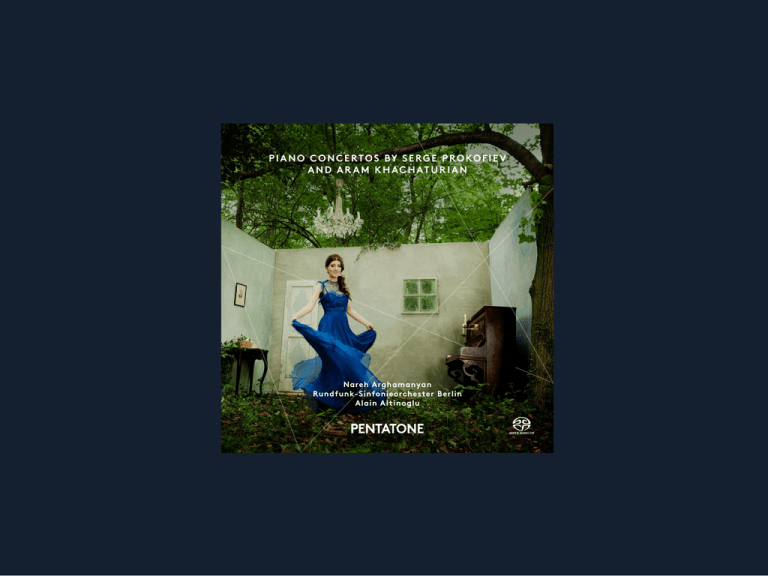
P I A N O C O N C E RT O S BY S E R G E P R O KO F I E V A N D A R A M K H A C H AT U R I A N Nareh Arghamanyan Rundfunk-Sinfonieorchester Berlin Alain Altinoglu Aram Khachaturian (1903-1978) Piano Concerto in D flat (1936) 1 2 3 15. 32 11. 21 9. 50 Allegro maestoso Andante con anima Allegro brillante Nareh Arghamanyan, piano Rundfunk-Sinfonieorchester Berlin Erez Ofer, concertmaster Alain Altinoglu, conductor This album has been recorded at the Haus des Rundfunks, RBB Berlin, Germany in October 2013. Serge Prokofiev (1891-1953) Piano Concerto No. 3 in C major, Op. 26 (1917-1921) 4Andante-Allegro 5 Tema – Var. 1 – Listesso tempo Var. 2 – Allegro Var. 3 – Allegro moderato (poco meno mosso) Var. 4 – Andante meditativo Var. 5 – Allegro giusto Tema – Listesso tempo 6 Allegro ma non troppo Andantino Total playing time 10. 13 9. 48 10. 27 67. 17 Aram Khachaturian Concerto for Piano and Orchestra in D flat major July 12, 1937 saw the official première of Aram Khachaturian’s hugely powerful Piano Concerto. The concert took place under the open sky in Sokolniki Park in central Moscow, featuring as soloist 29-year-old Lev Oborin, Soviet master-pianist and winner of the First Chopin Competition in 1927. However, a hastily assembled orchestra clumsily stormed its way through the extremely difficult score (written in D flat major); and the force of the wind blew conductor Lev Steinberg’s glasses right off his nose. After the concert, the 34-year-old composer English was seen leaning against a birch tree in a corner of the park, tears pouring down his cheeks... Resurgence around the Black Sea Transcaucasia (= South Caucasus), behind the Caucasus mountains – Georgia, Armenia, and Azerbaijan. For centuries, the various Christian, Arab and Persian cultures had enjoyed a mutually beneficial coexistence, until the collapse of the USSR, when the region turned into a focal point of bloody military clashes, a hotbed of corruption, religious wars, and separatism. However, at the beginning of the 20th century nationalistic intrigues played (as yet) only a minor role. Thus, Aram Khachaturian grew up in a modestly wealthy Armenian family of bookbinders in the Georgian capital Tbilisi, without being restricted by any fear of “ethnic contacts”. Later on, the composer acquired a global reputation, thanks mostly to his ballet Gayane: the “Sabre Dance” from this work was soon heading all the classical charts. In 2013, a selection of Khachaturian’s works was declared a UNESCO World Documentary Heritage. In 1947, it was again Lev Oborin who first introduced Khachaturian’s Piano Concerto to the Berlin Radio Symphony Orchestra. Well roared, lion The way Khachaturian combines the most diverse influences in his Piano Concerto has been often enough emphasized: in the music, one hears Armenian folk songs, the rhythms of the trans- Caucasian male dances, the Russian soul of Glazunov, the – from the perspective of the Black Sea – very western-sounding thunder of Tchaikovsky’s Piano Concerto in B flat minor, the dry severity of Prokofiev, the mellifluousness of Rachmaninov, and so on. However, no-one has yet mentioned Shakespeare’s “A Midsummer Night’s Dream,” Act 5, Scene 1 – “Well roared, lion”: of the 498 bars of the first movement, most range between f (= forte) and ffff (= quadruple fortissimo). Two extensive piano cadences – one slow and one fast – develop the musical material. They also allow the pianist to stop and smell all the technical “flowers” along the way (as commented by a British newspaper in 1940), which Khachaturian has planted here in abundance. “Flexed tones” When Khachaturian asked his colleague Prokofiev for a peer review of his draft for the second movement, the latter scoffed in his laconic manner: “Your pianist will be catching flies here.” Khachaturian immediately amended the work, elaborating the solo part with striking chords and virtuoso scales in accordance with romantic traditions. However, in the middle of the movement, a rare instrument makes its appearance. In most performances of the work, an edgy sound pushes into the dreamy, yet heavily dragging triple time: it is a flexatone, rattling its way in. The flexatone, a percussion instrument from the idiophone family, produces a tone somewhere between a musical saw and a bicycle bell by beating two wooden knobs against a flexible metal sheet. In this recording, however, the flexatone has been replaced by a musical saw. Conductor Alain Altinoglu based his choice on Khachaturian having, in fact, had in mind the much softer sound of this instrument, although at the première (and subsequent concerts) the composer agreed to the use of the tawdry flexatone in the absence of a musical-saw virtuoso. Fast-paced, dancing, spirited The third movement gets off to a thrilling and brilliant start. What we might consider the sound of jazzedup trumpets, is in fact Armenian folk music! Inspired by the virtuoso playing of an Aschug ensemble (= itinerant bards and mystics), glissandi rejoice their way up to the melodic climaxes. Repeated notes, figuration, scales, tremolos, and trills follow in quick succession. At the end, the now-tamed folk-music strides into a hymnic coda. The motto theme from the first movement rings out in massive double octaves. The volume of sound is so obvious, it does not need to be discussed... Serge Prokofiev Piano Concerto No. 3 in C major, Op. 26 Sergei Prokofiev himself was the soloist at the world première of his Piano Concerto No. 3, which took place in Chicago on December 16, 1921. “They did not understand it too well in Chicago, but they reacted favourably. In New York, they found it equally difficult to understand, but they did not react favourably. I have to face the truth: the final result of the season in America, which at the start held such promise for me, was a great big zero.” The situation was quite different in Europe, where Prokofiev regularly enjoyed great success with the work: for instance, as a guest of the Berlin Radio Symphony Orchestra during the 1920s. “Any child knows the third concerto” The composer Dmitri Kabalevsky reported that he once heard someone in a hotel room, very slowly and persistently practising individual passages from the concerto. To his surprise, it was Prokofiev himself behind the instrument. So he asked him why he was studying the piece like a student, even though he had so often played it in the major concert halls throughout the world. Prokofiev replied: “Any child knows the third concerto, and so every passage has to be absolutely perfect!” In fact, the composer did not omit a single pianistic effect in the concerto: sparkling running passages, sophisticated rhythms, and intricate sound-layering alternate with quiet, lyrical sections, with unexpected contrasts keeping musician and audience alike in continual suspense. The musical fireworks take place against a background of classical structures. The first movement follows the classical sonata form with two contrasting themes (preceded by a lyrical introduction) and a short development, in which the lyrical second theme is further elaborated. The impetuous main theme dominates the recapitulation. The following Andantino consists of a theme with five free variations, thus also remaining within the framework of the classical sequence of movements. Neither does the finale break with this structure: it is a rondo with one first theme and two secondary themes. There were several sides to Prokofiev, one of which shows the composer with classical ambitions and not as the “radical innovator,” who as an “enfant terrible” had confused his professors with his daring tonal language. Prokofiev himself described his work as an interaction between four main trains of thought: the classical, the innovative, the motoric, and the lyrical. “This train of thought remained unnoticed, or was recognized only in retrospect.” Strict self-organization “I get up at 8:30. After drinking a cup of hot chocolate, I check to see if the garden is still where I expect it to be. Then I sit down to work: right now, I’m working on the Piano Concerto No. 3.” In those days, Prokofiev was leading the life of a travelling virtuoso, thus rarely having a chance to enjoy a regular daily routine. Therefore, his stay at the small Breton seaside resort of St Brevinles-Pins was all the more relaxing for him. He had secluded himself there during the summer of 1921, together with his mother and his friend, the poet Boris Bashkirov (pseudonym Verin). Prokofiev systematically programmed his meals, piano exercises, walks, and daily chess game, which corresponded precisely with his temperament – he was almost manic in his pursuit of punctuality. In this atmosphere, the composer turned to sketches on which he had been working before leaving Russia. One of the first to hear excerpts from the new concerto was Prokofiev’s neighbour in Brittany, the symbolist poet Konstantin Balmont, who subsequently celebrated in a sonnet the pianist’s “sibilant spray.” In return, Prokofiev expressed his thanks by dedicating the concerto to Balmont. A blitheful blaze of the crimson flower, The instrument of the words plays tiny flames, Then suddenly extends the tongues of fire, From molten ore a stream has emerged. Moments dance waltzes. Centuries lead the gavotte. Prokofiev: music and youth in glorious bloom, Sibilant spray of a swirling spate. You satisfy the Craving for sound and tone: as if it were a tambourine, You beat the sun – powerful, invincible Scythian. Nareh Arghamanyan Highly acclaimed for her unique style, colourful tone and dazzling virtuosity, Nareh Arghamanyan is one of the most promising talents of her generation. KONSTANTIN BALMONT She has debuted with orchestras such as the Vienna Symphony, the City of Birmingham Symphony Orchestra, the Tonhalle-Orchester Zurich, the hr-Sinfonieorchester Frankfurt, the NDR Sinfonieorchester Hamburg, the Orchestre Philharmonique de Strasbourg, RTÉ Dublin, the Hong Kong Sinfonietta, and the Vancouver and Utah Symphonies. She has performed at the Wigmore Hall, Philharmonie Berlin, Herkulessaal Munich, Musikverein Vienna, Lincoln Centre New York, Kimmel Centre Philadelphia and Gardner Museum Boston. Upcoming highlights Photography by Kai Bienert include her debuts with the RadioSymphonieorchester Vienna, the Gulbenkian Orchestra Lisbon, Munich Symphonic, Copenhagen Philharmonic and others. Nareh Arghamanyan is a regular guest at international festivals such as the Schleswig-Holstein, Lanaudière, Lucerne, Marlboro, and Singapore Music Festivals. Conductors she works with include Alain Altinoglou, John Axelrod, Carl St. Clair, Sir Neville Marriner, Micheal Sanderling, Jean-Marie Zeitouni and Christoph Poppen. She has collaborated with PENTATONE since 2011 and has released a CD of solo works by Rachmaninov and a disc featuring the Liszt concertos, recorded with the RundfunkSinfonieorchester Berlin and Alain Altinoglu, both to great critical acclaim. Nareh Arghamanyan is laureate of more than 18 piano competitions, including the 1st Prize at the 2008 Montréal International Music Competition, the 1st Prize at the 2007 Piano Campus International Competition in Pontoise and the 2005 Josef Dichler Piano Competition Vienna. Born in Armenia in 1989, she has played the piano since the age of five. Three years later she began her studies with Alexander Gurgenov at the Tchaikovsky Music School in Yerevan. In 2004 she was the youngest student to be admitted to the University for Music and Performing Arts in Vienna, where she studied with Heinz Medjimorec. Currently she is continuing her studies with Arie Vardi in Hannover and with Avedis Kouyoumdjan in Vienna. Radio Symphony Orchestra Berlin The Radio Symphony Orchestra Berlin (RSB) dates back to the first hour of music broadcasting by Deutscher Rundfunk in October 1923. The orchestra’s chief conductors (incl. Marek Janowski, Sergiu Celibidache, Eugen Jochum, Hermann Abendroth, Rolf Kleinert, Heinz Rögner and Rafael Frühbeck de Burgos) have all helped to create a body of sound that shares the changing circumstances of 20th century German history in a very special way. Ever since its foundation, the RSB has nutured a close relationship with contemporary music. Important 20th and 21st century composers have come to the orchestra’s lectern in person or performed their own works as soloists: Paul Hindemith, Arthur Honegger, Serge Prokofiev, Richard Strauss, Arnold Schönberg, Igor Strawinsky, Kurt Weill, as well as Krzysztof Penderecki, Peter Ruzicka, Heinz Holliger and Jörg Widmann in more recent years. The RSB is particularly attractive for capable young conductors from the international music scene, with Andris Nelsons, Kristjan Järvi, Yannick Nézet-Séguin, Vasily Petrenko, Ludovic Morlot, Jakub Hrůša, Alondra de la Parra and Alain Altinoglu performing in recent years. The orchestra has been performing on important national and international stages for more than 50 years. Alongside regular tours of Taiwan, Korea and Japan, the orchestra also makes guest appearances at European festivals and in German centres of music. As the oldest German radio orchestra, the RSB has won a place in the top tier of European concert orchestras, especially since completing its tenpart concertante Wagner cycle in 2013. Alain Altinoglu Paris-born Alain Altinoglu has enjoyed an impressively successful career not only as an opera conductor, but on the concert podium as well. He is a regular guest at all major opera houses worldwide, including the Metropolitan Opera New York, the Wiener Staatsoper, the Lyric Opera of Chicago, the Teatro Colon Buenos Aires, the Deutsche Oper Berlin, the Staatsoper Unter den Linden, the Bayerische Staatsoper Munich and all opera houses in Paris. He regularly appears at the festivals in Salzburg, Orange and Aix-en-Provence. An accomplished orchestral conductor, Altinoglu has conducted distinguished orchestras such as the Chicago Symphony, Philadelphia Orchestra Association, Orchestre National de France, Orchestre de Paris, Orchestre Philharmonique de Radio France, Ensemble Intercontemporain, City of Birmingham Symphony Orchestra, Staatskapelle Dresden, Staatskapelle Berlin, Rundfunk Sinfonieorchester Berlin, Tonhalle-Orchester Zurich, Orchestre de la Suisse Romande, Radio-Symphonieorchester Vienna, Wiener Symphoniker and the Gulbenkian Orchestra Lisbon. Alongside conducting, Altinoglu maintains a strong affinity and command over the Lied repertoire. Regularly accompanying mezzosoprano Nora Gubisch at festivals and recital venues such as the Wigmore Hall in London, their recordings together have included a disc of songs by Henri Duparc (Cascavelle) and Marice Ravel (Naïve). Altinoglu has also recorded a repertoire of opera and symphonic music for Naïve, Universal and Deutsche Grammophon. Born in 1975, Alain Altinoglu studied at the Conservatoire National Supérieur de Musique de Paris, where he currently holds the position of visiting professor and head of the Conservatoire’s conducting class. Aram Chatschaturjan Konzert für Klavier und Orchester Des-Dur Am 12. Juli 1937 erlebte das mächtig gewaltige Klavierkonzert von Aram Chatschaturjan seine offizielle Uraufführung. Das Konzert fand unter freiem Himmel im Moskauer Zentralpark Sokolniki statt. Am Klavier saß der 29-jährige Lew Oborin, sowjetischer Meisterpianist und erster Chopinpreisträger 1927. Allerdings stürmte ein eilig zusammengerufenes Orchester mehr schlecht als recht durch die sehr unbequeme DesDur-Partitur. Dem Dirigenten Lew Steinberg riss der Wind die Brille weg. Deutsch Photography by Marco Borggreve Der 34-jährige Komponist wurde nach dem Konzert in einer Ecke des Parks gesehen, tränenüberströmt an eine Birke gelehnt … Aufbruch am Schwarzen Meer Transkaukasien, hinter dem Kaukasus – Georgien, Armenien, Aserbaidschan. Über Jahrhunderte griffen hier christliche, arabische und persische Kultur fruchtbar ineinander, nach dem Zerfall der UdSSR wurde die Region zu einem Brennpunkt blutiger militärischer Auseinandersetzungen, ein Hort von Korruption, Religionskriegen und Separatismus. Die nationalistischen Ränke spielten am Anfang des 20. Jahrhunderts noch kaum eine Rolle, so dass der Armenier Aram Chatschaturjan in der georgischen Hauptstadt Tbilissi als Sohn einer bescheiden begüterten Buchbinderfamilie aufwuchs, ohne dass irgendwelche ethnische Berührungsängste ihn eingeschränkt hätten. Weltruhm erlangte Chatschaturjan später vor allem mit dem Ballett „Gajaneh“, woraus der Säbeltanz in sämtliche Klassikcharts aufstieg. Eine Auswahl von Chatschaturjans Werken wurde 2013 zum UNESCO-Weltdokumentenerbe erklärt. Beim Rundfunk-Sinfonieorchester Berlin war es 1947 Lew Oborin, der das Klavierkonzert von Chatschaturjan erstmals vorstellte. Gut gebrüllt, Löwe Oft genug wird betont, wie sehr Chatschaturjans Klavierkonzert unterschiedlichste Einflüsse vereine: Armenische Volkslieder ließen sich finden, die Rhythmen der transkaukasischen Männertänze, die russische Seele Glasunows und der aus Schwarzmeerperspektive sehr westlich klingende Donner von Tschaikowskys b-Moll-Klavierkonzert, die trockene Härte Prokofjews, der Schmelz Rachmaninows und so weiter. Auf Shakespeare ist noch keiner gekommen: „Ein Sommernachtstraum“, 5. Akt, 1. Szene – „Well roared, lion“, gut gebrüllt, Löwe. Von den 498 Takten des ersten Satzes pendeln die meisten zwischen Forte und vierfachem Fortissimo. Zwei ausgedehnte Klavierkadenzen, eine langsame und eine schnelle, bringen die Entwicklung des musikalischen Materials voran. Außerdem erlauben sie dem Pianisten, all die klaviertechnischen Blumen am Wegesrand (wie es eine britische Zeitung 1940 formulierte) auszukosten, die Chatschaturjan hier im Überfluss ausgesät hat. Verbogene Töne Als Chatschaturjan seinem Kollegen Prokofjew einen Entwurf des zweiten Satzes zur Begutachtung vorgelegt hatte, spottete der in seiner lakonischen Art: „Hier wird der Pianist Fliegen fangen.“ Chatschaturjan besserte sofort nach, reicherte das Solo mit effektvollen Akkorden und virtuosen Skalen ganz im Stil der romantischen Traditionen an. Inmitten des Satzes ereignet sich jedoch ein instrumentatorisches Kuriosum. In den meisten Aufführungen drängt sich in das träumerische, und doch schwer schleppende Dreiermetrum ein nervöser Klang: Ein Flexaton scheppert dazwischen. Das Flexaton (to flex a tone = einen Ton biegen), ein Schlaginstrument aus der Gruppe der Selbstklinger (Idiophone) erzeugt einen Ton zwischen Singender Säge und Fahrradklingel durch das Schlagen von zwei Klöppeln gegen eine Metallplatte. In dieser Aufnahme erklingt anstelle des Flexatons eine Singende Säge. Alain Altinoglu hat sich dafür entschieden, weil Chatschaturjan eigentlich der ungleich weichere Klang dieses Instrumentes vorgeschwebt hatte, obwohl er bei der Uraufführung (und nachfolgenden Konzerten) dem Einsatz des ordinären Flexatons in Ermangelung eines Singende-SägeVirtuosen zugestimmt hatte. Temporeich, tänzerisch, temperamentvoll Brillant fetzt der dritte Satz dahin. Was wir vielleicht für angejazzte Trompeten halten könnten, ist armenische Folklore! Dem virtuosen Spiel eines Aschugen-Ensembles nachempfunden, jauchzen Glissandi hinauf zu den Melodiehöhepunkten. Tonwiederholungen, Figurenwerk, Skalen, Tremolo, Triller überschlagen sich förmlich. Am Schluss greift die nunmehr gebändigte Folklore in der Coda hymnisch aus. Das MottoThema des ersten Satzes ertönt in massiven Doppeloktaven. Die Frage nach der Lautstärke erübrigt sich. Sergei Prokofjew Klavierkonzert Nr. 3 C-Dur op. 26 Sergei Prokofjew selbst spielte die Uraufführung des Klavierkonzertes Nr. 3 am 16. Dezember 1921 in Chicago. „In Chicago verstanden sie es nicht besonders, aber verhielten sich wohlwollend. In New York verstanden sie es ebensowenig, verhielten sich aber nicht wohlwollend. Ich muss der Wahrheit ins Auge sehen: Das Endergebnis der Saison in Amerika, die so blendend für mich begonnen hatte, war gleich null.“ Ganz anders in Europa, hier erzielte Prokofjew mit dem Werk regelmäßig begeisterte Erfolge, u.a. in den 1920er Jahren als Gast des Rundfunk-Sinfonieorchesters in Berlin. „Das 3. Konzert kennt jedes Kind“ Der Komponist Dmitri Kabalewski berichtete, dass er einmal in einem Hotelzimmer jemanden ganz langsam und beharrlich einzelne Passagen aus dem Konzert üben hörte. Überrascht gewahrte er Prokofjew selbst am Instrument und fragte ihn, warum er das Stück wie ein Student studiere, obwohl er es doch so häufig auf allen großen Konzertpodien der Welt gespielt hatte. Die Antwort Prokofjews: „Das 3. Konzert kennt jedes Kind, und da muss schon jede Passage sitzen!“ Tatsächlich ließ der Komponist keinen pianistischen Effekt aus; perlende Passagenläufe, raffinierte Rhythmen und komplizierte Klangschichtungen wechseln mit stillen, lyrischen Teilen, unerwartete Kontraste halten Musiker wie Zuhörer ständig in Atem. Das musikalische Feuerwerk entfaltet seine Wirkung vor dem Hintergrund klassischer Strukturen. Der erste Satz folgt dem klassischen Sonatenhauptsatz mit zwei gegensätzlichen Themen (denen eine lyrische Einleitung vorausgeht) und einer kurzen Durchführung, in der das gesangliche zweite Thema verarbeitet wird. In der Reprise dominiert das ungestüme Hauptthema. Das folgende Andantino ist ein Thema mit fünf freien Variationen, bleibt also ebenfalls im Rahmen der klassischen Satzfolge. Aus dieser bricht auch das Finale nicht aus, eine Rondoform mit einem Haupt- und zwei Seitenthemen. Prokofjew besaß mehrere Gesichter, eines davon zeigt den Komponisten mit klassischen Ambitionen, nicht als den „radikalen Neuerer“, der als „enfant terrible“ mit kühner Tonsprache seine Professoren verwirrte. Prokofjew selbst beschrieb seine Arbeit als ein Zusammenwirken von vier Hauptlinien: die klassische, die innovative, die motorische und die lyrische Linie. „Diese Linie blieb unbemerkt bzw. sie wurde erst im Nachhinein erkannt.“ Straffe Selbstorganisation „Ich stehe auf um 8.30 Uhr. Nachdem ich eine heiße Schokolade getrunken habe, sehe ich nach, ob der Garten noch da ist, wo ich ihn vermute. Dann setze ich mich an die Arbeit: Ich schreibe gerade das Dritte Klavierkonzert.“ Selten genug hatte Prokofjew, der damals das Leben eines reisenden Virtuosen führte, die Gelegenheit, einem geregelten Tagesablauf nachzugehen. Umso erholsamer war für ihn im Sommer 1921 der Aufenthalt in dem kleinen bretonischen Badeort St. Brèvinles-Pins, wohin er sich mit seiner Mutter und dem befreundeten Dichter Boris Baschkirow (Verin) zurückgezogen hatte. Die systematische Regelmäßigkeit, mit der die Mahlzeiten, die Klavierübungen, Spaziergänge und die tägliche Schachpartie absolviert wurden, entsprach genau Prokofjews Naturell, dessen Streben nach Pünktlichkeit ihm fast zur Manie wurde. In dieser Atmosphäre wandte sich der Komponist Skizzen zu, die ihn schon vor seiner Abreise aus Russland beschäftigt hatten. Einer der ersten, der Ausschnitte aus dem neuen Konzert zu hören bekam, war Prokofjews Nachbar in der Bretagne, der symbolistische Dichter Konstantin Balmont, der daraufhin in einem Sonett des Pianisten „zischende Gischt“ feierte. Prokofjew bedankte sich seinerseits mit der Widmung des Konzertes an Balmont. Ein fröhlicher Brand der purpurnen Blume, Das Instrument der Worte spielt kleine Flammen, Um plötzlich die Feuerzungen auszustrecken, Aus geschmolzenem Erz ist ein Strom geworden. Augenblicke tanzen Walzer. Jahrhunderte führen die Gavotte. Prokofjew: Musik und Jugend in herrlicher Blüte, Zischende Gischt einer wirbelnden Flut. Du stillst Das Sehnen nach Klang und Ton: wie an ein Tambourin Schlägst du an die Sonne – kraftvoller, unbesiegbarer Skythe. KONSTANTIN BALMONT Nareh Arghamanyan Die hochgelobte Nareh Arghamanyan zählt aufgrund ihres einzigartigen Stils, ihres facettenreichen Tons und ihrer umwerfenden Virtuosität zu den vielversprechendsten Pianistinnen ihrer Generation. York, Kemmel Centre Philadelphia und Gardner Museum Boston. Zu den wichtigsten kommenden Auftritten zählen ihre Debüts mit dem RadioSymphonieorchester Wien, dem Gulbenkian Orchestra Lissabon, den Münchner Symphonikern und dem Copenhagen Philharmonic. Nareh Arghamanyan konzertierte bereits mit folgenden Orchestern: Wiener Symphoniker, City of Birmingham Symphony Orchestra, Tonhalle-Orchester Zürich, hrSinfonieorchester Frankfurt, NDR Sinfonieorchester, Orchestre Philharmonique de Strasbourg, RTÉ Dublin, Hong Kong Sinfonietta, Vancouver und Utah Symphonies. Sie hat Recitals in folgenden bedeutenden Sälen gegeben: Wigmore Hall London, Philharmonie Berlin, Herkulessaal München, Musikverein Wien, Lincoln Centre New Nareh Arghamanyan gastiert regelmäßig bei internationalen Festivals wie dem Schleswig-Holstein Musik Festival und den Festivals in Lanaudière, Luzern, Marlboro und Singapore. Sie hat mit folgenden Dirigenten gearbeitet: Alain Altinoglu, John Axelrod, Carl St. Clair, Sir Neville Marriner, Michael Sanderling, Jean-Marie Zeitouni und Christoph Poppen. Nareh Arghamanyan nimmt seit 2011 für das niederländische Label Pentatone auf. Erschienen sind eine CD mit Solo-Werken von Rachmaninov sowie eine Aufnahme mit Liszts Klavierkonzerten mit dem Rundfunk-Sinfonieorchester Berlin unter Leitung von Alain Altinoglu. Beide Aufnahmen wurden von der Kritik hochgelobt. Nareh Arghamanyan ist Preisträgerin bei 18 Klavierwettbewerben, darunter hat sie Erste Preise beim Internationalen Musikwettbewerb in Montreal 2008, beim Piano Campus International Competition in Pontoise sowie 2005 beim Dr. Josef-DichlerWettbewerb in Wien gewonnen. Die 1989 in Armenien geborene Nareh Arghamanyan begann mit fünf Jahren Klavier zu spielen. Drei Jahre später besuchte sie die TschaikowskyMusikschule in Eriwan, wo sie von Alexander Gurgenov unterrichtet wurde. 2004 wurde sie als bisher jüngste Studentin an der Universität für Musik und Darstellende Kunst Wien aufgenommen, wo sie bei Heinz Medjimorec studierte. Seit Oktober 2010 erhält sie Unterricht bei Arie Vardi in Hannover und bei Avedis Kouyoumdjan in Wien. RundfunkSinfonieorchester Berlin Das Rundfunk-Sinfonieorchester Berlin geht zurück auf die erste musikalische Funkstunde des deutschen Rundfunks im Oktober 1923. Die Chefdirigenten (u. a. Marek Janowski, Sergiu Celibidache, Eugen Jochum, Hermann Abendroth, Rolf Kleinert, Heinz Rögner, Rafael Frühbeck de Burgos) formten einen Klangkörper, der in besonderer Weise die Wechselfälle der deutschen Geschichte im 20. Jahrhundert durchlaufen hat. Das RSB ist seit seiner Gründung speziell mit der zeitgenössischen Musik vertraut. Bedeutende Komponisten des 20. Jahrhunderts traten selbst ans Pult dieses Orchesters oder führten als Solisten eigene Werke auf: Paul Hindemith, Arthur Honegger, Sergei Prokofjew, Richard Strauss, Arnold Schönberg, Igor Strawinsky und Kurt Weill ebenso wie in jüngerer Zeit Krzysztof Penderecki, Peter Ruzicka, Heinz Holliger oder Jörg Widmann. Das Rundfunk-Sinfonieorchester Berlin ist besonders für fähige junge Dirigenten der internationalen Musikszene attraktiv. So standen in den letzten Jahren u.a. Andris Nelsons, Kristjan Järvi, Yannick Nézet-Séguin, Juraj Valčuha, Vasily Petrenko, Ludovic Morlot, Jakub Hrůša, Alondra de la Parra und Alain Altinoglu am Pult. Seit mehr als 50 Jahren ist das Rundfunk-Sinfonieorchester auf wichtigen nationalen und internationalen Podien präsent. Neben regelmäßigen Tourneen nach Taiwan, Korea und Japan gastiert das Orchester auf europäischen Festivals und in deutschen Musikzentren. Spätestens seit Abschluss des zehnteiligen konzertanten WagnerZyklus ist der älteste deutsche Rundfunkklangkörper in der ersten Reihe der europäischen Konzertorchester angekommen. Alain Altinoglu Der 1975 in Paris geborene Alain Altinoglu ist gleichermaßen als Opern- und Konzertdirigent erfolgreich. So steht er als Gast regelmäßig am Pult der weltweit wichtigsten Opernhäuser: Metropolitan Opera New York, Wiener Staatsoper, Lyric Opera of Chicago, Teatro Colón Buenos Aires, Deutsche Oper Berlin, Staatsoper Unter den Linden, Bayerische Staatsoper München sowie alle Pariser Opernhäuser. Auch bei den Festspielen in Salzburg, Orange und Aix-en-Provence gastiert er regelmäßig. Als versierter Orchesterleiter hat Alain Altinoglu u.a. mit folgenden Orchestern zusammengearbeitet hat: Chicago Symphony, Philadelphia Orchestra Association, Orchestre National de France, Orchestre de Paris, Orchestre Philharmonique de Radio France, Ensemble Intercontemporain, City of Birmingham Symphony Orchestra, Staatskapelle Dresden, Staatskapelle Berlin, Rundfunk-Sinfonieorchester Berlin, Tonhalle-Orchester Zürich, Orchestre de la Suisse Romande, Radio-Symphonieorchester Wien, Wiener Symphoniker und Gulbenkian Orchester Lissabon. Neben dem Dirigieren besitzt Alain Altinoglu eine besondere Affinität zur Liedbegleitung. So arbeitet er regelmäßig mit der Mezzosopranistin Nora Gubisch bei Festivals und in internationalen Liedzentren wie der Londoner Wigmore Hall zusammen. Auf dem Label Cascavelle erschien eine gemeinsame Aufnahme mit Liedern von Henri Duparc, beim Label Naïve eine CD mit Liedern von Maurice Ravel. Altinoglu hat ebenfalls Opern und Symphonien für die Labels Naïve, Universal und Deutsche Grammophon eingespielt. Alain Altinoglu studierte am Conservatoire National Supérieur de Musique de Paris, wo er momentan als Gastprofessor und Leiter der Dirigentenklasse agiert. Acknowledgments Executive producer Stefan Lang (Deutschlandradio) & Job Maarse (PENTATONE) Balance engineer & Editing Jean-Marie Geijsen Audio recording & Postproduction Polyhymnia International B.V. English translation Fiona J. Stroker-Gale Front cover by Julia Wesely English Translation: Fiona J. Stroker-Gale Recording producer Job Maarse Product manager Angelina Jambrekovic Recording Engineer Roger de Schot Liner notes Steffen Georgi German translation Franz Steiger Design freshu Other recordings with Nareh Arghamanyan: PTC 5186 397 Liszt – The 2 Piano Concertos; Totentanz; Fantasy on Hungarian Folk Tunes PTC 5186 399 Rachmaninov – Morceaux de Fantaisie, Op. 3; Etudes Tableaux, Op. 33; A co-production with Deutschlandradio Kultur, ROC GmbH and Pentatone Variations on a Theme of Corelli, Op. 42 Premium Sound and Outstanding Artists Music of today is evolving and forever changing, but classical music stays true in creating harmony among the instruments. Classical music is as timehonored as it is timeless. And so should the experience be. We take listening to classical music to a whole new level using the best technology to produce a high quality recording, in whichever format it may come, in whichever format it may be released. Together with our talented artists, we take pride in our work of providing an impeccable way of experiencing classical music. For all their diversity, our artists have one thing in common. They all put their heart and soul into the music, drawing on every last drop of creativity, skill, and determination to perfect their compositions. www.pentatonemusic.com
